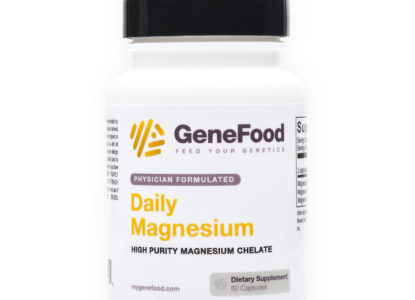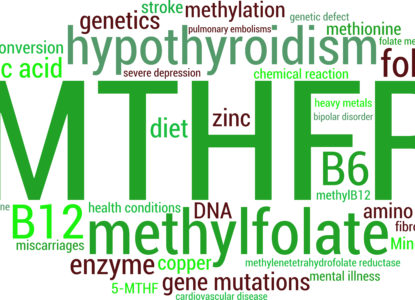13 Nutrients That Impact DNA Methylation
Article at a Glance
- Neither ‘too little’ nor ‘too much’ methylation is a good thing.
- Your diet determines the availability of essential nutrients and the activity of enzymes required for the metabolism of methyl groups.
- Diet may also contain nutrients, especially polyphenols, that directly affect DNA methylation in certain types of cells and tissues.
- DNA methylation in healthy cells is highly robust and is unlikely to be perturbed by polyphenols and other inhibitory nutrients reviewed below taken as part of a normal diet.
Genes Mentioned

Contents
Methylation is a complex topic to understand, but it’s also very hot in health and wellness circles right now, and we get lot of questions from customers about “proper methylation.” Reader beware: this isn’t a topic that can be glossed over and packaged into an SEO-friendly article; any discussion of methylation requires nuance and some complexity, and we aren’t here to sell supplements, so get ready for a deep dive. Last, it’s impossible to categorize nutrients as either “good or bad” based on whether they increase or inhibit methylation. As with anything, the goal is balance.
What is methylation?
At the biochemical level, methylation refers to the addition of a methyl group (-CH3) to another molecule, such as a DNA nucleotide (in most cases cytosine) or a protein amino acid (such as arginine or lysine).
Adding a simple methyl group can fundamentally change the function of proteins and gene expression patterns, affecting many other processes in the body.
Large numbers of animal and human experimental studies have investigated how diet affects methylation. 1 However, relatively few have focused on the biochemical mechanisms behind diet’s effects on methylation.
These mechanisms appear to include:
- Altering the substrates and co-factors necessary for proper DNA methylation
- Changing the activity of enzymes regulating the one-carbon cycle.
Your diet determines the availability of essential nutrients and the activity of enzymes required for the metabolism of methyl groups. Your diet may also contain nutrients, especially polyphenols, that have a direct effect on DNA methylation in certain types of cells and tissues. 2
While severe deficiencies in the body’s methylation mechanisms are incompatible with life, even a mildly reduced efficiency of this cycle is undesirable.
This is partly because inefficient methylation cycle leads to the accumulation of homocysteine. Excess homocysteine (i.e., that which is not utilized by the methylation cycle to produce methionine) is converted by the body to potentially toxic products such as homocysteine thiolactone that can damage proteins and is associated with increased risk of cardiovascular diseases. There is also evidence that changes in diet that affect the methylation cycle can lead to alterations in the patterns of DNA methylation in various tissues of the body, although the physiological consequences of this remain incompletely understood.
#1. Folate
- Increases methylation
- Food sources include leafy greens and foods fortified with folic acid
Folate is a vital nutrient in the one-carbon pathway as it facilitates the transport of methyl groups needed for DNA methylation and homocysteine remethylation. 3
As a key substrate in the methylation cycle, folate is required to generate sufficient amounts of the methyl groups for DNA and protein methylation in the cells. As expected, diets deficient in folate show impairment in the methylation cycle, with some effects on DNA methylation. Conversely, high doses of folate supplementation appear to increase methylation at certain loci (places on specific chromosomes) and may be linked with a slightly increased risk of some cancers. This is a prime example of the need to balance methylation rather than either over supplementing or removing it from our diet entirely.
Most supplemental folate comes in the form of folic acid, which is easier to store and incorporate into foods. However, supplementation with folic acid may not be beneficial if an individual has an issue with their one-carbon cycle, as may be the case if they carry the common risk T allele of the C677T polymorphism in MTHFR.
If the one-carbon cycle is ‘jammed’, attempting to push more folic acid through the pathway won’t work and will instead lead to an accumulation of folic acid or folate. In such individuals, it may, therefore, be preferable to supplement with alternative forms such as L-methylfolate, or some of the other nutrients discussed below, which offer a more targeted approach to supporting methylation.
#2. Methionine
- Increases methylation
- Food sources include animal protein and dairy
Just as with a high folate diet, a diet high in methionine is also thought to increase DNA methylation. This is because more methionine means a bigger pool of SAM available for use in methylation processes.
Animal products such as meat and dairy are the greatest dietary sources of methionine. As such, diets especially rich in these foods can lead to hypermethioninemia (too much methionine), which is associated with the development of neurological issues and certain cancers. 1 2
Accordingly, diets with a lower, but still sufficient, methionine content have been linked to increased lifespan and improved health in certain animal models. However, individual genetic variation and environmental factors makes it difficult to define a one-size-fits-all dose for dietary methionine.
Noted longevity researcher Valter Longo has highlighted the potential inflammatory impact of diets that are too high in methionine. For an overview, see Protein Quantity and Source, Fasting Mimicking Diets, and Longevity.
#3. Betaine
- Increases methylation
- Sugar beets and whole grains are rich sources of betaine.
Betaine, or trimethylglycine, is another important methyl donor and can be produced by choline or acquired through food. An amino acid derivative, betaine is typically sourced from plants.
As we know, remethylation of homocysteine is a major part of the methionine cycle. One process uses the enzyme methionine synthase (MS), which requires vitamin B12 as a co-factor and also depends indirectly on folate and other B vitamins. However, there is a second pathway that uses the enzyme betaine-homocysteine methyltransferase (BHMT) and requires betaine as a co-factor.
Betaine can then be further processed by the enzyme dimethylglycine dehydrogenase to produce folate, which can then be incorporated into the wider methylation cycle. As such, betaine is very important in cases where the traditional pathway for regenerating methionine has been compromised, as may occur in individuals with polymorphisms in the MS or MTHFR gene.
#4. Choline
- Increases methylation
- Rich food sources include eggs and chickpeas
While choline is a key nutrient in its own right, it also plays a major role in the methylation process in two distinct ways. First, choline is an important precursor molecule for betaine. Maintaining sufficient levels of choline is, therefore, essential for keeping this part of the pathway moving. Second, choline is typically converted to phosphatidylcholine, which is used by cells throughout the body to form their cell membranes and to synthesize neurotransmitters.
The enzyme Phosphatidylethanolamine N-Methyltransferase (PEMT) can also create phosphatidylcholine by converting phosphatidylethanolamine. This process is also involved in the formation of homocysteine from methionine. If PEMT cannot function because levels of phosphatidylcholine are too high, due to a very high dietary choline intake, then this pathway can stall, leading to difficulty generating new SAM molecules. However, choline methyl-deficient diets have also been linked to reductions in SAM and increased levels of SAH, suggesting alterations in DNA methylation pathways.
Just to further show the complexity of methylation and nutrition, a dietary folate deficiency may lower choline and betaine levels in the liver, while choline deficiency may decrease liver folate stores, thereby affecting methyl transfer in the liver. Clear as mud, right?
#5. Vitamin B2
- Increases methylation
- Dairy and yogurt are rich food sources
Vitamin B2 (riboflavin) acts as a coenzyme and plays a major role in the production of the body’s main energy molecule adenosine triphosphate (ATP). Vitamin B2 is also the major co-factor for the MTHFR enzyme, which is key to regulating the one-carbon pathway and wider methylation cycle.
Without adequate amounts of B2, MTHFR activity slows down, which can lead to a decrease in SAM and, therefore, reduced global methylation. Too little B2 can also lead to the accumulation of SAH, with its associated health impacts.
Luckily, deficiencies in B2 are uncommon in the West as many processed foods are enriched with the vitamin. However, individuals who carry one of the risk alleles for the various polymorphisms in MTHFR may wish to consider supplementation to ensure the adequate function of this gene.
#6. Vitamin B6
- Increases methylation
- Rich food sources include beef liver, tuna, and salmon
Vitamin B6 (pyridoxine) acts as a co-factor for the SHMT enzyme, which sits upstream of MTHFR in the methylation cycle. As such, low levels of B6 may slow down the pathway as THF isn’t processed to 5,10-MTHF quickly enough for MTHFR’s requirements.
Vitamin B6 also has other functions in the methylation cycle, this time involving homocysteine remethylation. As we’ve seen, methionine and homocysteine sit at opposite ends of the methionine cycle. While both methionine and homocysteine play an important role in DNA methylation, excessive levels of homocysteine are associated with several negative health effects, and particularly an increased risk of cardiovascular diseases.
Excess homocysteine can be cleared through the action of two enzymes known as cystathionine beta and gamma ligase. And this is where vitamin B6 comes in. Both enzymes use vitamin B6 as a co-factor. As such, a lack of B6 slows the activity of these enzymes, resulting in an accumulation of homocysteine.
Outside of methylation related co-factor effects, B6 is also vital in the synthesis of amino acids and important neurotransmitters such as serotonin, dopamine and GABA. Levels of these chemicals can be significantly affected by altered methylation pathways. This means that anyone carrying risk alleles for any of the polymorphisms in the wider methylation cycle may wish to consider supplementation of vitamin B6 to support the cycle as a whole, including supporting homocysteine regulation and neurotransmitter synthesis.
#7. Vitamin B12
- Increases methylation
- Food sources include eggs and animal protein
Last but not least in our round-up, vitamin B12 (cobalamin). This rather unusual molecule, containing a Cobalt atom at its center, plays a key role in DNA synthesis, putting it right at the heart of epigenetics and methylation.
B12 also sits at the heart of the methionine cycle, acting as the substrate for MS which is the main pathway for processing homocysteine to methionine. In the absence of vitamin B12, MS activity stalls, homocysteine accumulates, and SAM levels are reduced, leading to an overall reduction in methylation activity.
#8. Tea polyphenols
- Inhibit DNA methylation
- Rich food sources include green tea
Tea polyphenols (including catechin, epicatechin, and EGCG) and bioflavonoids (quercetin, fisetin, and myricetin) have been seen to inhibit key DNA methylation enzymes, DNA methyltransferases (DNMT). , in a concentration-dependent manner in vitro. 1
High doses of EGCG were shown to decrease global DNA methylation levels in cultured cells. As DNA methylation inhibits gene activation, researchers found that the expression of some genes was activated as a result. 2 The effect of dietary concentrations of polyphenols is unlikely to be strong enough to exert physiological effects on DNA methylation in healthy people. However, they can potentially add to the effects of other dietary components or deficiencies.
In addition, modulation of DNA methylation patterns by tea polyphenols may have a particularly important role in the context of cancer, since cancer cells often exploit DNA methylation to switch off tumor suppressor genes. For example, in at least one study, EGCG was seen to reactivate some methylation-silenced genes in human colon cancer HT-29 cells, prostate cancer PC3 cells, and KYSE cells.3 DNA methylation in cancer cells may be less robust and thereby more amenable to modulation by dietary factors. Therefore, by inhibiting DNA methylation in these genes, tea polyphenols may help support the body’s own mechanisms for preventing tumor growth.
#9. Genistein
- Inhibits DNA Methylation
- Rich food sources include soybeans, chickpeas, and other plant foods
Genistein, a phytoestrogen present in soybeans, chickpeas, and other plant foods, may also have a dose-dependent inhibitory effect on DNMT activity and, thus, DNA methylation. 4 This effect is weaker than for EGCG in tea and isn’t expected to be seen with dietary intake of soy isoflavones.
Genistein supplements may have an observable effect, however, as seen in a mouse study where 300 mg of genistein/kg was positively correlated with alterations in prostate DNA methylation. 5
#10. Resveratrol
- Inhibits methylation
- Food sources include grape skins and red wine
The antioxidant resveratrol, present in grape skins and red wine, has been seen to behave similarly to genistein, decreasing promoter methylation.
Other polyphenols, including quercetin, fisetin, and myricetin may inhibit DNMT activity by transferring SAM to SAH.
Coffee polyphenols can also have an impact on methylation.
Two common coffee polyphenols, caffeic acid and chlorogenic acid, have also been seen to inhibit DNA methylation in a concentration-dependent manner, likely due to increased SAH formation. 6
Catechins also increase SAH in the reaction catalyzed by COMT.
#11. Vitamin C
- Inhibits DNA methylation
- Rich food sources include apples, oranges, and fruits
It has been shown that high doses of ascorbate (vitamin C) may alter DNA methylation in vitro.
In particular, ascorbate caused widespread DNA demethylation of nearly 2,000 genes in embryonic stem cells in one study by altering levels of DNMTs and the DNA demethylase enzymes TET2-TET3. 7
#12. Curcumin
- Inhibits DNA methylation
- Rich food sources include turmeric
Curcumin, the pigment found in turmeric root, has been seen to inhibit DNMTs and induce hypomethylation.
In fact, this activity of curcumin may increase the response to the hypomethylating drug docetaxel in people being treated for breast cancer. 8
#13. Lycopene
- Inhibits DNA methylation
- Rich food sources include tomatoes, carrots, watermelons, papaya, and other fruits and vegetables
Finally, lycopene has been linked to hypomethylation.
In summary, folic acid and vitamins B2, B6 and B12 are critical for the methylation cycle. In addition, studies suggest that polyphenols, particularly EGCG, are inhibitors of DNA methylation,The fact that cancer cells often turn off tumor suppressor genes using DNA methylation makes polyphenols, especially in high doses and/or in more potent modified forms, potentially interesting candidates for cancer therapies.
An important note
Outside of the cancer context, neither ‘too little’ nor ‘too much’ methylation is a good thing, and exact patterns of DNA methylation at specific loci in specific cells are required to ensure appropriate gene control. However, DNA methylation processes in healthy cells are highly robust and are unlikely to be perturbed by polyphenols and other inhibitory nutrients reviewed above taken as part of a normal diet.
However, for individuals with genetic impairments in the methylation machinery or highly imbalanced diets these effects could potentially start manifesting themselves in ways that are challenging to predict due to the complexity of epigenetic gene control.



